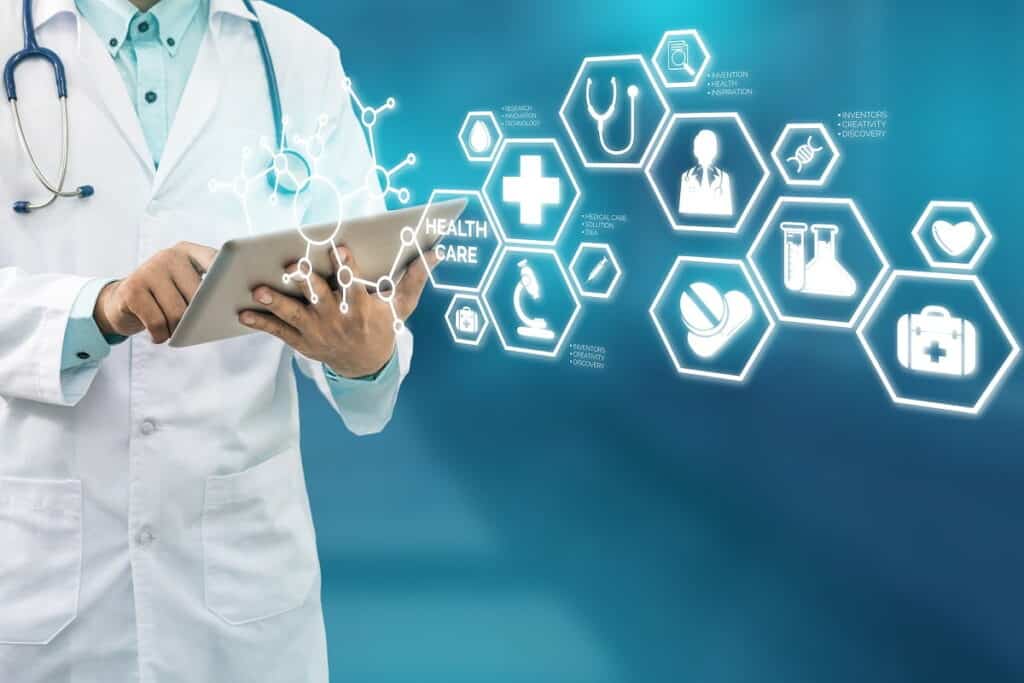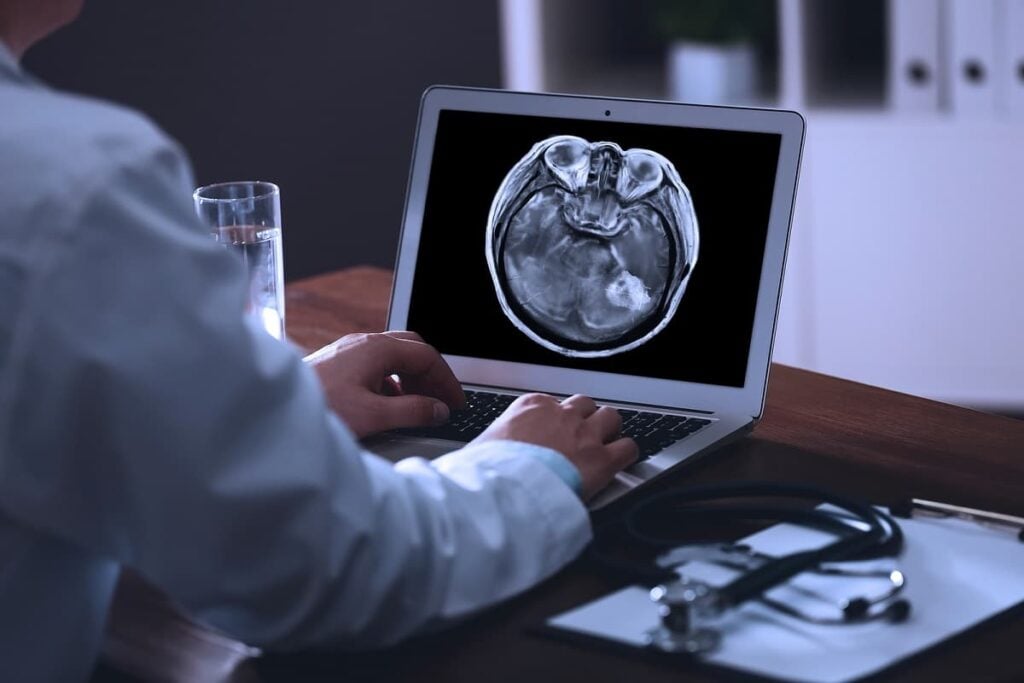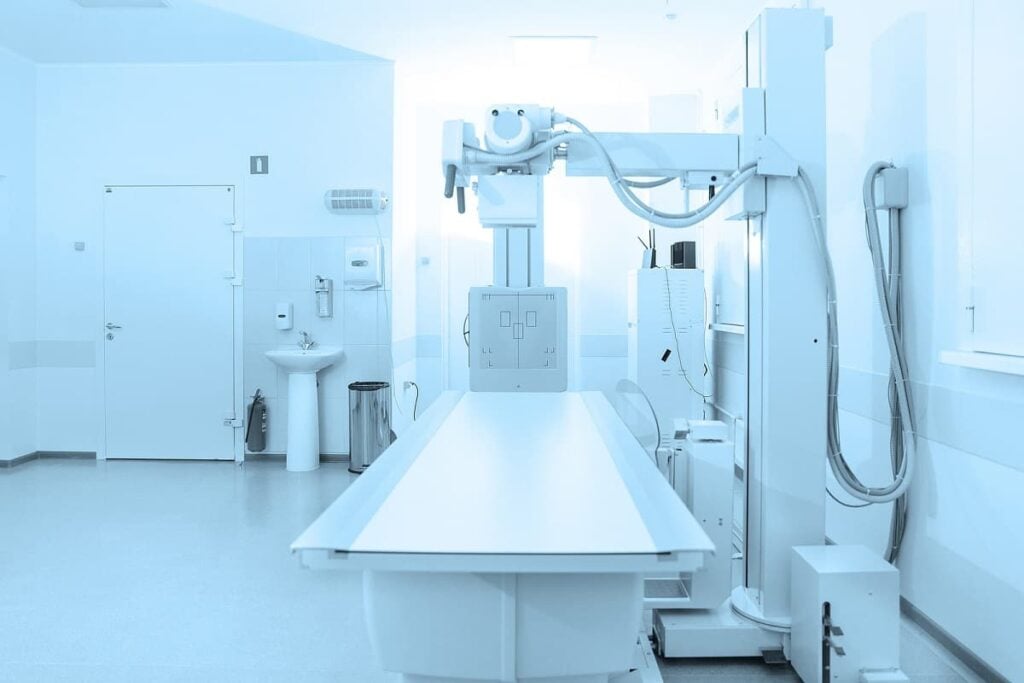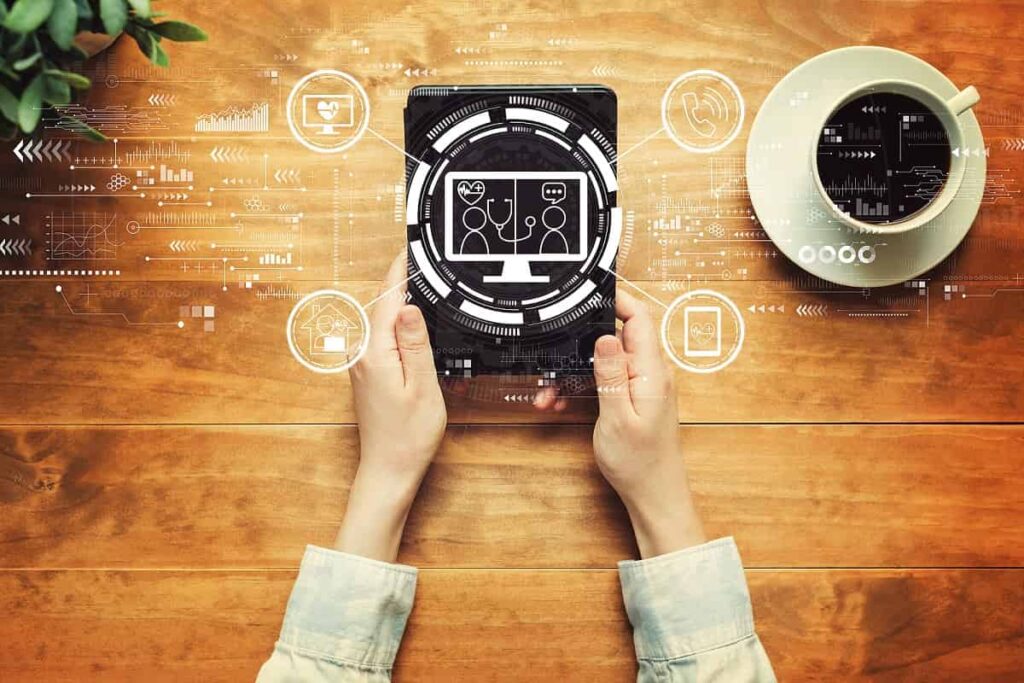AI Healthcare Company Offers Software as a Medical Device
Table of contents

It’s probably no surprise that money is pouring into life sciences and healthcare startups during the biggest medical crisis in a century. CB Insights reported that global healthcare funding hit a new record $31.6 billion in this first quarter of 2021. It’s also no shock that the two biggest trends – artificial intelligence and telehealth – also reaped record amounts of private cash. AI healthcare startups raised nearly $2.5 billion, while telehealth companies did even better by netting $4.2 billion in equity funding. That’s the third consecutive quarter to hit record highs in both sectors dating back to Q3’20.

The record-busting streak happens to coincide with a mega-round for a Boston-based startup called Biofourmis that has deployed a machine learning platform for remote patient monitoring that appears to be rapidly gaining traction. Since we’re long Teladoc (TDOC), a telehealth company that overpaid acquired Livongo for its AI-based monitoring and coaching platform, we want to keep tabs on potential competitors. Last month, we dropped iRhythm (IRTC) from our Nanalyze Disruptive Tech Portfolio watch list after the company threw a tantrum over Medicare reimbursements. But retail investors who still have skin in the game with iRhythm should definitely keep reading, because Biofourmis appears to be a legit threat in using AI for monitoring heart patients and even predicting cardiac events.
Software as a Medical Device
Founded in 2015 and originally based in Singapore, Biofourmis has raised about $143.6 million to date. Most of the money has come from two rounds since 2019 – a $35 million Series B in May 2019 and a $100 million Series C in September 2020. The investor list contains a few immediately recognizable names such as the Massachusetts Mutual Life Insurance Company, Sequoia Capital, and SoftBank (9984.T), which manages the massive Vision Fund. The company has been on something of a roll since its 2019 breakout when it received 510(k) clearance from the U.S. Food and Drug Administration (FDA) for its machine learning and AI-powered Biovitals Analytics Engine. Biovitals is just one of a growing number of AI algorithms that have been approved or cleared by the FDA in the category of software as a medical device.
In fact, it was the second time in 2019 that Biofourmis received 510(k) clearance, a designation that allows a company to commercialize a medical device (or algorithm) without requiring a stringent pre-market approval (PMA) process that involves proving safety and efficacy. That’s because a 510(k) cleared device has demonstrated it is as safe and effective as similar instruments that have already gone through a PMA. The first clearance was actually for Biovitals RhythmAnalytics, a cloud-based software that automatically interprets more than 15 types of cardiac arrhythmias. The deep neural network behind RhythmAnalytics trained on four million EKGs before it hit prime time.
Predicting Medical Problems
The Biovitals Analytics Engine serves as the foundation for what Biofourmis calls its digital therapeutics solutions. It can process multiple physiological signals beyond the heart such as respiratory rate in real-time using FDA-cleared sensors. The algorithms then “identify the correlation between multiple vital signs and the patient’s daily activities, building an individualized biometric signature that is dynamically updated based on incoming data.” The system alerts providers when it measures deviations from baseline. The company claims this early warning system can identify problems before a life-threatening event occurs.
And it has the data to back it up. In one study, for example, the Biovitals Analytics Engine predicted a cardiac event 12 days in advance of a heart failure-related hospitalization in a 73-year-old man who had multiple comorbidities, including hypertension, chronic obstructive pulmonary disease (COPD), and diabetes. (Frankly, you don’t have to be Doogie Howser to figure that this guy was probably headed to the ER at some point in the near future.) In another case involving a 68-year-old man, also with multiple comorbidities, the system alerted clinicians that the patient had not been doing a good job taking his medication. While the guy ended up taking a trip to the emergency room, he avoided hospitalization because the medical team made changes to his medication thanks to the Biovitals warning.
Digital Therapeutics
These case studies illustrate a couple of the big selling points behind the Biovitals Analytics Engine. It reportedly helps reduce rehospitalization rates or length of stay, and also provides guidance on medication. Regarding the latter, Biofourmis believes its platform will play an emerging role in what it calls digital therapeutics, a sort of merging of AI and pharmacology. In fact, the company recently reorganized into two business units, one of which is focused on clinically validated, software-based therapeutics called Biofourmis Therapeutics. The new division is working with pharmaceutical companies like AstraZeneca (AZN) to improve drug efficacy, reduce costs, and provide better patient outcomes.

The company’s flagship solution, BiovitalsHF (for heart failure) is a “prescription software” that not only detects early signs of heart failure but “augments guideline-directed use of heart.” Another solution, still in development, is Painfocus, which provides objective pain assessments to guide therapeutic decisions for patients that hopefully won’t rely on too many opioids. Two clinical trials are underway for groups who experience pain related to cancer and post-orthopedic surgery.
Recent Acquisitions
A third AI-based solution called Gaido is another type of prescription software that continuously monitors oncology patients for early signs of deterioration pre- and post- treatment. The name reflects the company behind the platform, Los Angeles-based Gaido Health, which Biofourmis acquired last year to push further into the at-home cancer care market. Gaido Health’s solution combines information on vital signs collected via remote monitoring in the home, patient surveys, and analytics to detect early signs of complications in patients with cancer who have been recently discharged from the hospital. Keeping immune-compromised patients from being exposed to those germ factories called hospitals is definitely a good thing.

In 2019, Biofourmis acquired Zürich, Switzerland-based Biovotion AG, which developed the Everion biosensor. The clinical-grade device is a multi-sensor platform worn on the arm that measures more than 20 parameters in real time, including heart rate, respiratory rate, blood oxygenation, and skin temperature, among others. It also collects non-clinical parameters such as motion intensity and steps, energy expenditure, sleep quality and, heart rate variability. The deal also came with more than 60 global patents covering most of the wearable and sensor technology that exists for the arm or hand.
Staying Home
The obvious end goal for the Biofourmis software as a medical device platform is to keep patients at home and out of the hospital. The other division created by the company’s re-org, Biofourmis Health, is focused on virtual care models to manage patients remotely as they transition from acute to post-acute care. Biofourmis rolled out a nationwide program called Biovitals Hospital@Home late last year in collaboration with Brigham and Women’s Hospital, a Harvard Medical School teaching hospital.

A study published last year demonstrated that hospital-level care in the home can decrease healthcare costs by nearly 40% compared with usual hospital care. Thanks to the ‘Rona, there are some additional economic incentives to keep sick patients at home: Late last year, the Centers for Medicare & Medicaid Services, to save hospital beds, agreed to reimbursement payments on par with inpatient rates to treat patients in their homes for more than 60 different diagnoses, including conditions tracked by Biovitals such as heart failure and COPD. But it’s not just about saving (and making) money (really). The clinical study of 91 patients also showed improved outcomes, with 7% of home hospital patients readmitted within 30 days compared with 23% of inpatients.
The Hospital@Home program, touted as a turnkey solution, brings together Biofourmis’ AI- and biosensor-based solutions for remote patient monitoring and analytics with a patient-facing companion app for engagement and communication.
Conclusion
Biofourmis currently has partnerships with seven pharmaceutical companies and 10 healthcare systems. It’s quickly expanding its range of services outside of cardiovascular to oncology and pain management. No doubt more solutions will follow as it aggregates and analyzes its growing library of sensor data. While there is a hardware component, we like the fact that the platform is mainly software as a medical device. These are the sorts of solutions that can scale rapidly, with huge margins thanks to subscription-based models. Unfortunately, there’s no financial information to review at this time, but the company is reportedly valued at about $700 million. Now that SoftBank is helping bankroll Biofourmis, we’d expect to see its star rise rapidly.
Sign up to our newsletter to get more of our great research delivered straight to your inbox!
Nanalyze Weekly includes useful insights written by our team of underpaid MBAs, research on new disruptive technology stocks flying under the radar, and summaries of our recent research. Always 100% free.















